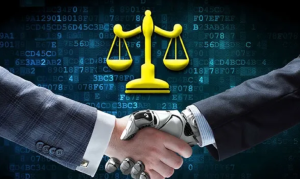In the fast-evolving world of law, legal professionals have been seeking innovative ways to enhance efficiency, accuracy, and client service. One of the most transformative developments in recent years has been the integration of technology, particularly Artificial Intelligence (AI), into legal practice. Legal tech and AI are reshaping the legal landscape, offering new tools, strategies, and possibilities for lawyers and law firms.

The Intersection of Law and Technology
The legal profession has traditionally been associated with long hours of research, paperwork, and meticulous review of documents. However, with the advent of legal tech and AI, this landscape is changing rapidly. Attorneys are embracing technology to streamline processes and make more informed decisions. Here’s a closer look at the impact of these technologies:
1. Legal Research and Document Review
One of the most significant contributions of AI in the legal field is in legal research and document review. Legal professionals often need to sift through vast amounts of information, and AI-powered platforms can significantly reduce the time and effort involved. Advanced algorithms can analyze case law, statutes, and legal documents to provide quick and comprehensive results.
2. Predictive Analytics
Predictive analytics, driven by AI, enables lawyers to anticipate case outcomes, make more informed decisions, and develop winning strategies. By analyzing past case data and identifying patterns, AI can provide insights into how a particular case might unfold, allowing attorneys to prepare more effectively.
3. Contract Analysis and Management
Contract analysis is another area where AI is proving invaluable. AI tools can review and analyze contracts, identifying important clauses, potential risks, and compliance issues. This not only saves time but also helps in minimizing legal risks for businesses.
4. Chatbots and Virtual Assistants
Chatbots and virtual assistants are becoming increasingly common in the legal industry. These AI-driven programs can handle routine client inquiries, schedule appointments, and provide information on legal processes. This allows attorneys to focus on more complex tasks while still providing excellent client service.
5. E-Discovery
Electronic discovery (e-discovery) is a time-consuming process in legal proceedings. AI algorithms can swiftly identify relevant documents, reducing the time and cost involved in the discovery phase of litigation.
Ethical Considerations in Legal Tech
While legal tech and AI offer numerous benefits, there are ethical and regulatory considerations that legal professionals must address. These include issues related to data privacy, transparency, accountability, and bias in AI algorithms. As AI systems make decisions and recommendations, it’s crucial to ensure they align with legal and ethical standards.
Challenges and Concerns
Despite the promising advancements in legal tech and AI, there are some concerns within the legal community. One primary concern is the potential for job displacement. As routine tasks become automated, there is a fear that some legal jobs may become obsolete. However, many experts argue that AI should be viewed as a tool to enhance the work of lawyers rather than replace them.
Another challenge is the cost of implementing these technologies. Smaller law firms may face budget constraints when trying to adopt AI tools and legal tech platforms. This presents an opportunity for legal tech companies to develop more affordable solutions to democratize access to these technologies.
The Future of Legal Practice
The integration of legal tech and AI is not a trend; it’s a fundamental shift in how legal services are delivered. As these technologies continue to advance, we can expect to see several key developments in the near future:
1. Enhanced Efficiency: Legal tech and AI will continue to streamline tasks, making legal services more efficient, cost-effective, and accessible.
2. Improved Decision-Making: Predictive analytics will become more accurate and play a more prominent role in shaping legal strategies.
3. Personalized Services: AI can help lawyers provide more personalized services to clients, addressing their specific needs and concerns.
4. Regulatory Framework: As technology advances, there will be an increased focus on creating and enforcing ethical and legal guidelines for the use of AI in the legal profession.
Conclusion
Legal tech and AI are redefining the practice of law. By automating routine tasks, enhancing legal research, and providing valuable insights, these technologies are enabling legal professionals to work more effectively and provide better services to their clients. While challenges and ethical concerns exist, the future of the legal industry is undoubtedly intertwined with the continued development and integration of technology.
As legal professionals embrace these advancements, they must also remain committed to upholding ethical standards and ensuring that AI and legal tech serve the interests of justice and the public good. The future promises a legal landscape where technology and human expertise work hand in hand to deliver justice, efficiency, and innovation.

